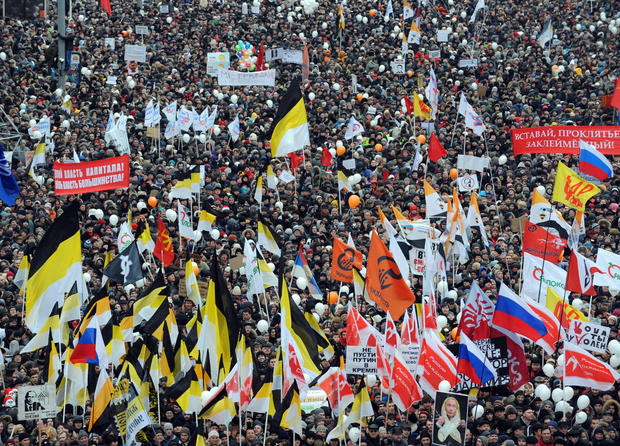Largest protests yet in Moscow
MOSCOW — Tens of thousands of demonstrators rallied in the Russian capital Saturday in the largest protest so far against election fraud, signaling growing outrage over Prime Minister Vladimir Putin's 12-year rule.
The demonstration in Moscow was even bigger than a similar protest two weeks ago, although rallies in other cities in the far east and Siberia earlier in the day drew much smaller crowds than on Dec. 10. The demonstrations are the largest show of discontent the nation has seen since the 1991 Soviet collapse.
Rally participants densely packed a broad avenue, which has room for nearly 100,000 people, about 1.5 miles from the Kremlin, on a snowy day. They chanted "Russia without Putin!"
A stage at the end of the half-mile avenue featured placards reading "Russia will be free" and "This election Is a farce." Heavy police cordons encircled the participants, who stood within metal barriers, and a police helicopter hovered overhead.
The recent protests in Moscow and other cities have dented Putin's authority as he seeks to reclaim the presidency in a March vote. The Kremlin has responded by promising a set of political reforms that would allow more political competition in future elections.
But protest leaders say they will continue pushing for a rerun of the Dec. 4 parliamentary election and punishment for officials accused of vote fraud. They say maintaining momentum is key to forcing Putin's government to accept their demands.
"We don't trust him," opposition leader Boris Nemtsov told the rally, urging protesters to gather again next month to make sure that the proposed changes are put into law.
Nemtsov called on the demonstrators to go to the polls in March to unseat Putin. "A thief must not sit in the Kremlin," he said.
"We want to back those who are fighting for our rights," said 16-year-old Darya Andryukhina, who said she had also attended the previous rally.
"People have come here because they want respect," said Tamara Voronina, 54, who said she was proud of her three sons, who had also joined the protest.
The protests reflect a growing public frustration with Putin, who ruled Russia as president in 2000-2008 and has remained the No. 1 leader after moving into the prime minister's seat due to a constitutional term limit.
Putin has accused the United States of fomenting the protests in order to weaken Russia and has said, sarcastically, that he thought the white ribbons many protesters wear as an emblem were condoms.
In a response to Putin's blustery rhetoric, one protester Saturday held a picture montage of Putin with his head wrapped in a condom like a grandmother's headscarf. Another held a sign saying: "Hillary, I'm still waiting for my money," referring to U.S. Secretary of State Hillary Rodham Clinton.
"We can't tolerate such a show of disrespect for the people, for the entire nation," journalist and music critic Artyomy Troitsky said in a speech at the rally. He wore a white gown that resembled a condom, mocking Putin's comment.
Although Putin has derided the demonstrators as Western stooges, he has also sought to soothe public anger by promising to relax his grip on the political scene.
He has promised to liberalize registration rules for opposition parties and restore the direct election of governors he abolished in 2004. Putin's stand-in as president, Dmitry Medvedev, spelled out those and other proposed changes in Thursday's state-of-the nation address, promising to restore direct elections to fill half of the seats in parliament and ease rules for the presidential election.
Some opposition leaders welcomed the proposals, but stressed the need for the protests to continue to force the Kremlin to quickly turn the promises into law.
"These measures are insufficient," said Arina Zhukova, 45, another participant in Saturday's rally. "They are intended to calm people down and prevent them from showing up at rallies."
The electoral changes, however, will only apply to a new election cycle years away, and the opposition has stressed the need to focus on preventing fraud in the March presidential election and mounting a consolidated challenge to Putin.
In another sign of the authorities' efforts to stem the tide of public anger, the presidential human rights commission early Saturday issued a statement condemning violations in the vote and backing protesters' calls for the ouster of Central Election Commission chief Vladimir Churov.
It said that allegations of widespread fraud have led to a "moral and political discrediting of the election system and the lower house of parliament, creating a real threat to the Russian state."
